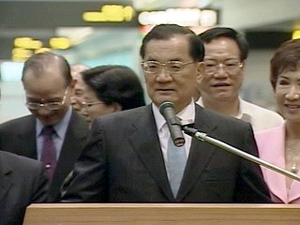
KMT Chairman Lien Chan makes a brief speech at the
airport before leaving for Mainland. (Photo: chinanews.cn)
The Kuomintang (KMT) Party of China Chairman Lien Chan left Taipei at about
11:15 a.m. Tuesday morning to embark on a historic week-long visit to the
mainland, according to sources in Taiwan.
The KMT delegation will first arrive at Nanjing in east China's Jiangsu
Province, once capital of the KMT-ruled Chinese government before 1949, via Hong
Kong.
Before leaving, Lien Chan made a brief speech at the airport, saying he
wishes to increase understanding about the mainland and exchange views with
mainland leaders on common concerns of both sides across the Taiwan Straits in
this trip.
"Friends on both sides of the Straits should grasp this opportunity to seek
mutual benefits and mutual assistance," said Lien.
Thousands of people gathered at Taipei's Taoyuan airport Tuesday morning to
see the delegation off holding banners like "Bon Voyage, the Journey of Peace"
amid "pro-independence" protests.
The delegation, at the invitation of the Communist Party of China (CPC)
Central Committee and its General Secretary Hu Jintao,will visit the mainland
cities of Nanjing, Beijing, Xi'an and Shanghai from April 26 to May 3.
Leaders of the two parties will meet for the first time in 60 years.
The delegation is expected to arrive at Nanjing Tuesday afternoon.
Around 500 reporters had gathered in Nanjing Monday for the event, including
nearly 100 reporters from Taiwan, some 200 mainland reporters and some from Hong
Kong, Macao and foreign countries.
"It's an indication of the keen expectations for stability and development of
cross-Straits relations of the people on both sidesof the Taiwan Straits," said
Zhang Xianwen, director of a research center under the Nanjing University
studying the history of the KMT rule in China.
Huang Jiashu, professor with the Beijing-based People's University, said
although the KMT is not the ruling party in Taiwan, it is an important political
force in Taiwan as it holds a considerable number of seats in the "legislature"
of Taiwan and rules some counties and cities.
"Therefore, if the dialogue between the CPC and the KMT produces consensus in
principle about concerns of the Taiwan compatriots, it will surely help to ease
and promote cross-Straits relations," he said.
He urged the Taiwan authorities to approve contents of any possible consensus
that would benefit the Taiwan compatriots and use executive power to push
forward the implementation.
"If the Taiwan authorities controlled by the Democratic Progressive Party
(DPP) could positively and pragmatically seek toease and develop cross-Straits
relations, they will also win scores from the people on both sides of the
Straits," said Huang.



